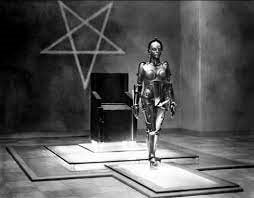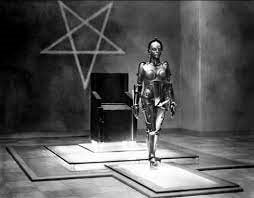
Details:
Directed by: Fritz Lang
Written by:
Thea von Harbou
Fritz Lang
Cast:
Alfred Abel
Brigitte Helm
Gustav Frohlich
Rudolf Klein-Rogge
Music by Gottfried Huppertz
Released: 1927
Breakdown:
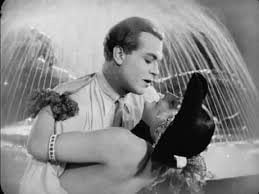
The future is glorious and filled with fun and idle play unless you are a worker. In the megacity of Metropolis, equality is non-existent. On the surface, the wealthy elite spends their time pleasing and living in grand buildings while spending time in lush gardens. They do so without a second thought to how everything they enjoy is powered. It is easier to not think about what is happening below, in the depths. Far below the city is where the workers live. Their very existence is just to keep the town alive and to move forward for the elite. They live with no joy, no sunlight, and no freedom.
One day the city master Joh Federsen’s son Freder is out enjoying a pleasure garden. He is making his choice as to what girl he will spending his free time with when suddenly a strange woman leading a large group of children barges into the garden. Maria is a prophet who shows the worker children what their “brothers” do all day while their families work and die far below the surface. Freder is enchanted by Maria and begins to follow her below when she leaves.
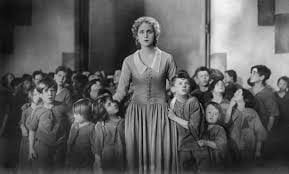
While below the city, Freder witnesses an explosion that kills some of the workers. Instead of this just being “the way things are,” Freder has a vision of the workers being sacrificed to an ancient god to keep the city running. Gripped with disgust and fear, Freder returns to the surface to speak to his father. When his father learns of the explosion, he is not upset about the dead workers but instead with his assistant, Josaphat. He is angry that he did not hear the news from his assistant but rather his son. He is unmoved by the deaths of the workers because, to him, they are below his family in more than just the physical way.
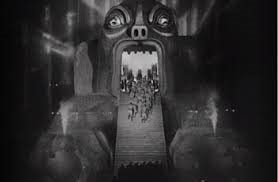
While Freder is still in his father’s office, Grot, the workers’ boss, comes in to deliver some drawings of a secret map found on two of the dead workers. This is strike two for the assistant since he is learning this news from someone other than Josaphat. Josaphat is fired from his position. This is the worst thing that could happen because being dismissed from the city master means that he will have to live his life below the surface now. Stricken with grief, Josaphat leaves the office and attempts suicide in the hallway. Freder, however, sensing something not right, runs out of the office and stops the former assistant from making any hasty decisions. Freder invites him to come to stay at his place and says he will meet him there later that night.
Freder journeys back down into the worker’s dwellings and switches places with one of the workers. While operating the machine, he reaches a piece of paper that falls out of the uniform the worker gave Freder. Upon examination, it is the same map found on the two dead workers. While he is looking at it, another worker walks by and says that “she” wants them to all meet at 2.
Back on the surface, Joh Fredersen enlists the help of inventor Rotwang. It is discovered that Rotwang was in love with Fredersen’s now dead wife and Freder’s mother, Hel. He shows Joh a machine that he has made to take the place of their deceased love Hel. After, Rotwang explains the map. The two travel down to the catacombs just in time to see a large group of workers gathering around Maria as she preaches to them. Maria says that a mediator between the hands and the head must come soon. Freder, believing that he is the one that will be the mediator between the workers and elite, stays behind to confess his feelings for Maria. Joh orders the inventor to place Maria’s likeness on the machine he created and have her sow discord in the workers. Rotwang has his own intentions for the machine, however. He plans to kill Freder and take over the city.
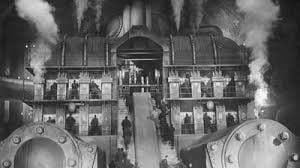
Maria is then kidnapped by Rotwang, and he sets in motion his plan. After transferring Maria’s likeness to the machine, he sends it to Fredersen. After missing his wife, Joh then embraces the machine only to be spied on by his son, who thinks it is the real Maria. Freder is now in a mental breakdown state, unaware that the machine version of Maria is causing chaos among the workers by ordering them to murder each other.
Once Freder is freed from his mental breakdown, he returns to find all the chaos below the surface. The false Maria encourages all the workers to destroy the machine and flood their city. In doing so, they put the lives of their children at risk. The real Maria escapes Rotwang and helps to save all of the children. The worker’s boss, Grot, is angry with the workers because not only did they destroy everything, but they flooded the city, killing all their children. None of them know that the children are safe. In a rage, the workers burn the machine Maria at the stake to discover its true self.
However, the real Maria is not safe yet because Rotwang thinks he is in love with her and will stop at nothing to have her. He chases her to a rooftop, where Freder begins to fight him to save Maria. At the climax of the fight, the mad inventor is thrown from the rooftop to his death. This is witnessed by the entire city. In a prophetic ending, Freder joins his father and Grotto’s hands to become the mediator between the two worlds.
Metropolis is one of the most intense and entertaining silent films ever made. The music that Gottfried Huppertz produces in the film deserves much of the credit. In many silent films, the music seems to be an afterthought to fill space; however, it sets the tempo for the entire film and plays almost like a music video in many scenes. Upon its initial release, mixed reviews came in. While some roared with applause, others saw the film as nothing more than propaganda trash. However, the test of time speaks volumes to the cultural impact the film has had for 100 years now. When someone asks me what silent film they should watch, this is always one of three I recommend.
Written exclusively for TheLastPicture.Show by Jacob Ruble
Disclosure: The links on this page are “Affiliate Links” and while these are shown at no costs to our viewers, they generate commissions for our website(s)


